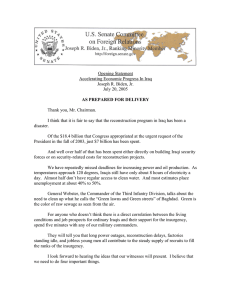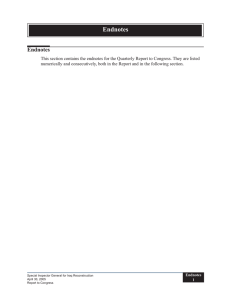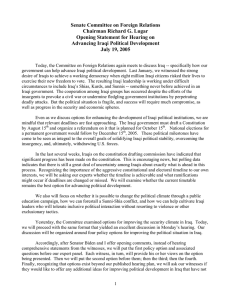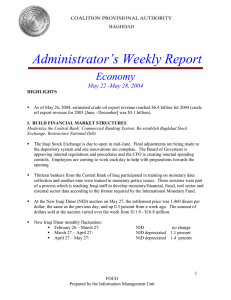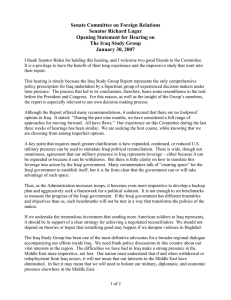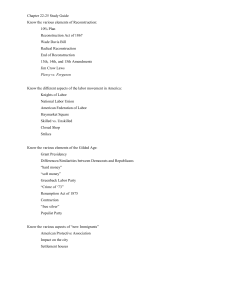Senate Committee on Foreign Relations Senator Richard Lugar
advertisement
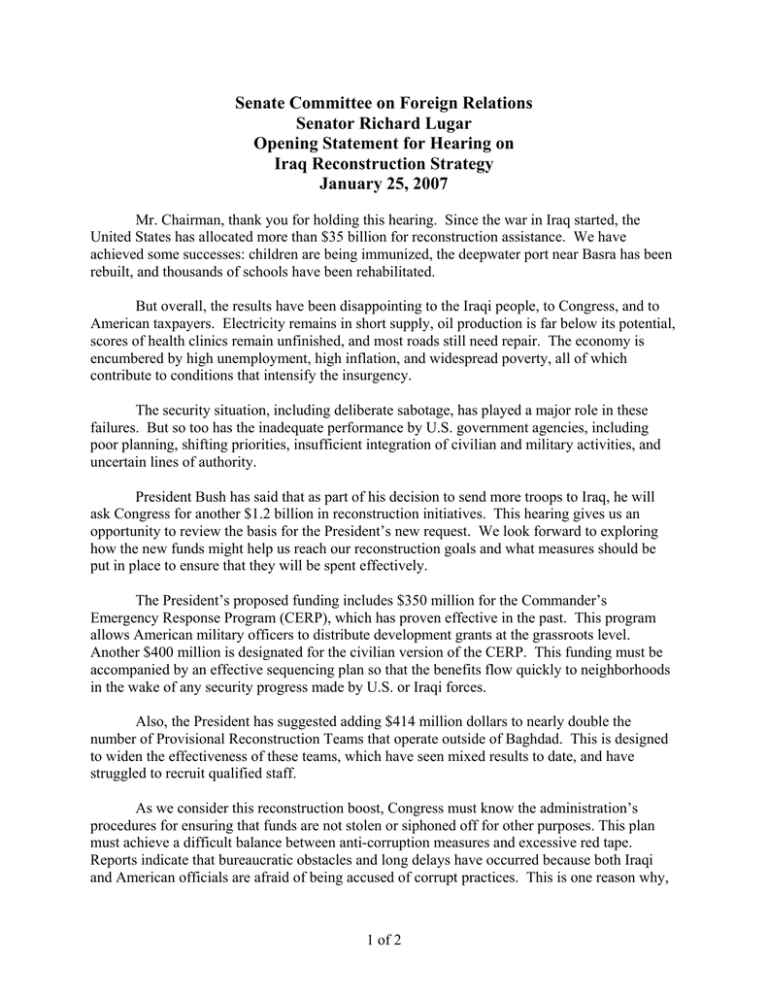
Senate Committee on Foreign Relations Senator Richard Lugar Opening Statement for Hearing on Iraq Reconstruction Strategy January 25, 2007 Mr. Chairman, thank you for holding this hearing. Since the war in Iraq started, the United States has allocated more than $35 billion for reconstruction assistance. We have achieved some successes: children are being immunized, the deepwater port near Basra has been rebuilt, and thousands of schools have been rehabilitated. But overall, the results have been disappointing to the Iraqi people, to Congress, and to American taxpayers. Electricity remains in short supply, oil production is far below its potential, scores of health clinics remain unfinished, and most roads still need repair. The economy is encumbered by high unemployment, high inflation, and widespread poverty, all of which contribute to conditions that intensify the insurgency. The security situation, including deliberate sabotage, has played a major role in these failures. But so too has the inadequate performance by U.S. government agencies, including poor planning, shifting priorities, insufficient integration of civilian and military activities, and uncertain lines of authority. President Bush has said that as part of his decision to send more troops to Iraq, he will ask Congress for another $1.2 billion in reconstruction initiatives. This hearing gives us an opportunity to review the basis for the President’s new request. We look forward to exploring how the new funds might help us reach our reconstruction goals and what measures should be put in place to ensure that they will be spent effectively. The President’s proposed funding includes $350 million for the Commander’s Emergency Response Program (CERP), which has proven effective in the past. This program allows American military officers to distribute development grants at the grassroots level. Another $400 million is designated for the civilian version of the CERP. This funding must be accompanied by an effective sequencing plan so that the benefits flow quickly to neighborhoods in the wake of any security progress made by U.S. or Iraqi forces. Also, the President has suggested adding $414 million dollars to nearly double the number of Provisional Reconstruction Teams that operate outside of Baghdad. This is designed to widen the effectiveness of these teams, which have seen mixed results to date, and have struggled to recruit qualified staff. As we consider this reconstruction boost, Congress must know the administration’s procedures for ensuring that funds are not stolen or siphoned off for other purposes. This plan must achieve a difficult balance between anti-corruption measures and excessive red tape. Reports indicate that bureaucratic obstacles and long delays have occurred because both Iraqi and American officials are afraid of being accused of corrupt practices. This is one reason why, 1 of 2 according to news reports, Iraqis last year were able to utilize only about 20 percent of their $6 billion capital budget. Oil production is at the heart of Iraqi economic potential. Iraq is still pumping less oil than it did before the war. What is necessary to achieve an increase in Iraqi oil production? Under the bestcase scenario, how soon can we expect a significant increase in oil revenue for the Iraqi government? When is it likely that the new Iraqi hydrocarbon law will take effect? What impact will the law have on oil production and on foreign investment in the petroleum sector, absent any significant change in the security situation? Is there reason to believe that this law could improve the security situation by guaranteeing the Sunnis a portion of the oil revenue? Finally, we must ask how President Bush’s request fits into the larger picture of getting the Iraq economy on its feet, which is the ultimate purpose of reconstruction. Is there a plan that will lead to sustainable economic growth? To complement the proposed new U.S. funds, Prime Minister Maliki has committed $10 billion of Iraqi funds for reconstruction, including a jobs program. Are these make-work jobs that will expire when the funds dry up, or will they serve to prime the pump to create long-term employment? Is this Iraqi program well-coordinated with the United States’ efforts, and is it dependent on Congress appropriating all the funds the President will request? I welcome our distinguished panel and look forward to our discussion. ### 2 of 2


